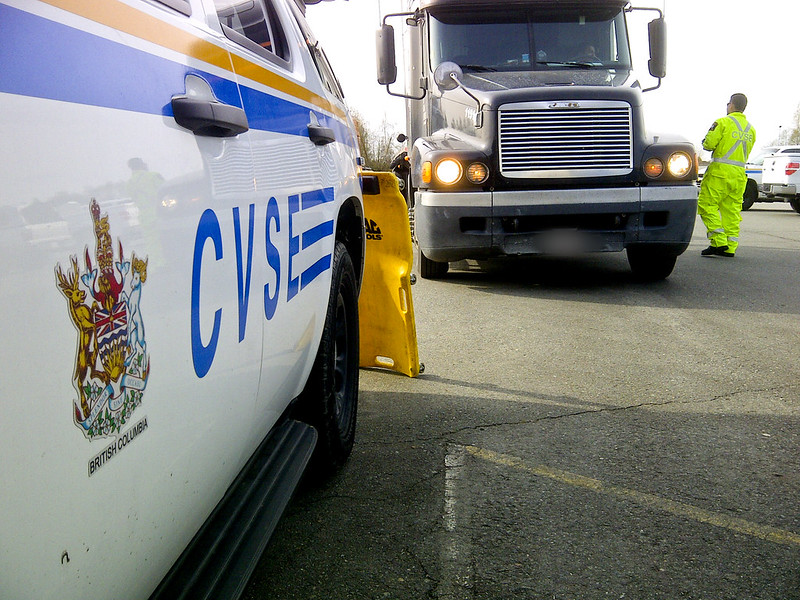Resources > CVSA English Proficiency Regulation
New CVSA English Proficiency Rules Take Effect June 25: What Truck Drivers Need to Know

Credit: Flickr
Introduction
Starting June 25, 2025, truck drivers across the U.S. will face new roadside inspection rules focused on English-language proficiency. The Commercial Vehicle Safety Alliance (CVSA) will begin enforcing language assessments as part of its North American Standard Out-of-Service Criteria, in alignment with an executive order from President Donald Trump and a directive from Transportation Secretary Sean Duffy.
These changes mark a significant shift for the industry, particularly for drivers whose first language isn’t English. Here’s what you need to know to stay compliant, avoid violations, and keep your rig on the road.
What’s Changing on June 25
CVSA inspectors will now assess a driver’s ability to speak and understand English during roadside inspections. If a driver cannot demonstrate basic English communication skills, they may be placed out of service immediately.
This rule enforces 49 CFR § 391.11(b)(2), a regulation that has technically been in place for years but was previously not enforced due to an Obama-era suspension. With the updated FMCSA (Federal Motor Carrier Safety Administration) memo issued May 20, all federal and state inspectors are now expected to uniformly enforce it.
What Will Happen at Roadside Inspections
Roadside inspections will now include language proficiency evaluations. These assessments begin with a verbal interview between the driver and inspector. If the inspector finds the driver unable to effectively communicate, they may: Issue an out-of-service violation without further testing, or continue to a second step that assesses the driver’s ability to read and interpret highway signs, including dynamic electronic message boards.
The goal is to ensure drivers can understand safety instructions, read road signs, and respond to officials without translation tools.
What Counts as Noncompliance
A driver may be deemed noncompliant if they:
- Cannot hold a basic conversation in English
- Struggle to understand or interpret English traffic signs
- Use translation aids like cue cards, phone apps, or interpreters during the test
- Cannot respond to official inquiries or complete required reports in English
Inspectors are instructed to document all failed communication attempts before issuing an out-of-service order.
Who’s Affected and Who’s Not
This rule applies to all commercial motor vehicle drivers operating in the U.S., whether they are U.S. citizens or international drivers. However, there are a few exceptions:
Drivers in U.S.-Mexico border commercial zones will still be cited if they fail the test but won’t be placed out-of-service immediately.
Hearing-impaired drivers with a valid hearing exemption are not affected if they cannot speak orally in English.
Industry Response and What You Can Do
Industry groups and motor carriers are seeking clarity from FMCSA, but enforcement is moving forward as scheduled. To stay compliant, carriers should inform drivers of the new rules and offer English-language training if needed.
For drivers, now is the time to brush up on your English, especially around trucking-related language, road signs, and basic conversation.
Frequently Asked Questions on CVSA English Proficiency Enforcement
Q: Do I need to speak perfect English to pass the inspection?
A: No, you don’t need to speak perfect English. However, you must be able to hold a basic conversation, understand and respond to roadside officials, read traffic signs in English, and fill out reports and records.
Q: What will the inspector ask me during the language test?
A: Inspectors will start by speaking with you in English. If you appear confused or unable to respond appropriately, they may ask additional questions or assess your ability to understand common U.S. road signs, including digital signs.
Q: Can I use translation apps or cue cards during the inspection?
A: No. FMCSA has made it clear that translation aids such as apps, I-Speak cards, or interpreters are not allowed, as they may hide a driver’s inability to communicate directly in English.
Q: What happens if I fail the English test?
A: You may be issued an out-of-service violation, meaning you cannot continue operating your commercial vehicle until the issue is resolved. The inspector must also document your failure with supporting evidence.
Q: Are drivers near the U.S.-Mexico border affected the same way?
A: Not exactly. Border zone drivers can still be cited under the rule, but they will not be placed out-of-service or disqualified immediately, according to FMCSA instructions.
Q: I’m hearing-impaired. Will I be disqualified if I can’t speak English verbally?
A: No. Hearing-impaired drivers with a valid hearing exemption will not be considered noncompliant if they cannot communicate orally in English.
Q: How can I prepare for this new rule?
A: Practice basic English conversation, especially around trucking terms and directions. There are many free and low-cost resources online to help drivers improve their English skills, including apps, videos, and in-person classes.
Conclusion
These new rules are part of a broader push to improve safety on U.S. roads. While they may pose challenges for some drivers, being prepared will help you avoid violations and keep your career on track.
Whether you’re an individual driver or a fleet operator, take action now. Review the FMCSA guidelines, educate your team, and make sure everyone understands what’s at stake when June 25 rolls around.
